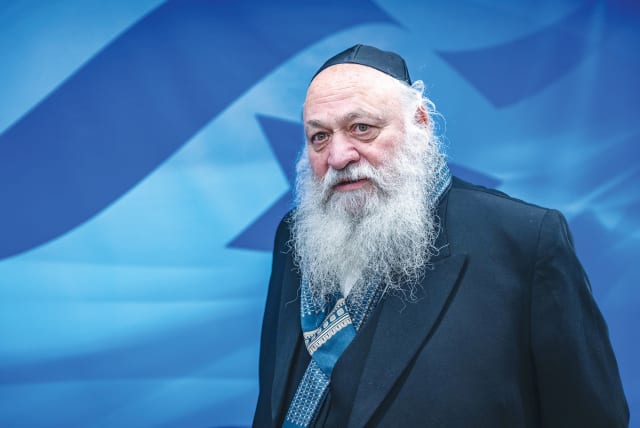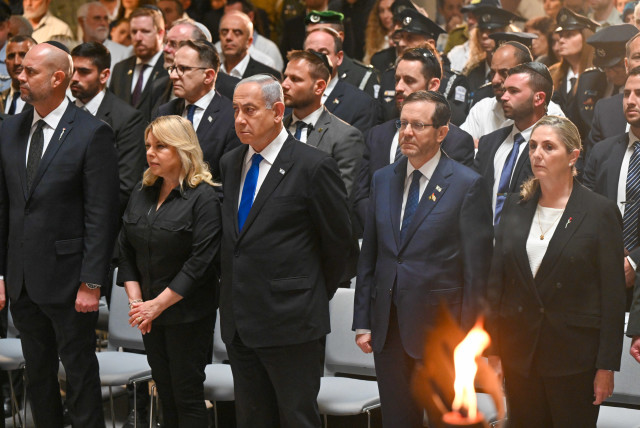Don’t miss the opportunity to integrate haredim in Israel - opinion

Seventy-five years after David Ben-Gurion gave the famous exemption to 400 yeshiva students, the state is again facing a critical juncture.
Kiryat Gat, a sleepy town in the Negev, is the place where ultra-Orthodox ministers go on Remembrance Day. The reason is that the city – known as the site of one of Intel’s most advanced semiconductor fabrication plants in the world – is also home to a large community of Gur Hassidim.
The custom started back in 2010 when former health minister Yaakov Litzman, the past head of United Torah Judaism, started attending the official state ceremony in Kiryat Gat on Remembrance Day. And that is what he did consecutively since. While Litzman and his Hassidim do not serve in the IDF, his participation at the ceremony was widely seen as a form of outreach to the people who serve.
Everyone stands together
It was a nice message: everyone might not serve, but everyone stands together on this hallowed day.
Construction and Housing Minister Yitzhak Goldknopf, who replaced Litzman as the chairman of United Torah Judaism (UTJ) ahead of the last election, was supposed to follow in his predecessor’s footsteps on Tuesday as the government’s official representative at the Kiryat Gat ceremony.
But then the uproar began. Protesters among the bereaved families started a campaign calling on government ministers not to attend the ceremonies. With everything going on in the country, they said, it was not the time for politicians to come. Prime Minister Benjamin Netanyahu and Defense Minister Yoav Gallant decided that, despite the possibility that the cemeteries would turn into a place of conflict on the nation’s saddest day, ministers – who they referred to as symbols of the state – would still attend.
But then some started to draw their own conclusions. Public Diplomacy Minister Galit Distel Atbaryan from Likud canceled her participation. So did Shas minister Haim Biton. Goldknopf did the same.
“I wanted to come and honor the memory of the fallen,” Goldknopf said when announcing his decision not to come to Kiryat Gat. “I was informed that alongside the bereaved families who asked for my presence, there are also families for whom my presence will cause discomfort.”
As a result, the haredi minister said he would instead go to the Western Wall to read psalms in memory of the fallen soldiers.
The creation of a clearer divide
IT IS not our place to judge bereaved families who have paid the ultimate price as citizens of this country. But, did Goldknopf’s decision improve the situation in the country? Did it somehow make it seem that there is no divide? Also, don’t protesters want to see greater involvement of haredim in the machinations of the country? Isn’t attending an IDF memorial service a step in that direction?
What seems to be at play here, is less the specific ceremony or the specific day, and more one of the direct consequences of the coalition’s attempt to push through judicial reform – the creation of a clearer divide between two different camps that exist in Israel: those who serve in the IDF, and those who do not.
From the beginning, the protests seemed to be partially about this. Yes, the main issue that drove people out to the streets was the attempt by the Likud and its coalition partners to weaken Israel’s democracy. Nevertheless, there was a feeling that under the anti-reform slogans, there was a fear among the secular and moderate religious in Israel that they were being replaced by the far-right and the ultra-Orthodox.
This was about a class change that was taking place, and people decided to push back by refusing to accept the situation. Their frustration is legitimate: a large swathe of the nation feels that they carry a greater burden for the country by serving in the military, as well as working and paying taxes at a higher rate.
The numbers help to explain: Today, Haredim make up about 1.3 million of Israel’s citizens and due to the community’s uniquely high birthrate, the ultra-Orthodox sector will be about 30% of the population in around 30 years.
This is fine on its own. The problem is that while approximately 75% of Haredi women work (close to the national average of 85%), only 50% of men work and out of those, only a third work in full-time positions.
And this is where the situation gets even more complicated: According to the Bank of Israel, when this population growth happens, if the government wants to continue providing welfare on a per capita basis as it does today, the state will need to increase taxes across the board by 16%. That means that people in top-tier jobs who are already paying 45% in taxes, will now be required to pay 61 cents on every dollar or shekel they make.
And while 30 years seems far away, it is around the corner.
A haredi boy born tomorrow will be in his mid-30s then. If he is to have the opportunity to get a job in hi-tech, medicine or law, he needs to learn the core curriculum of math, science and English now. Under the current situation, even if he gets a job in 25 or 30 years, due to his lack of education, it is unlikely to be one that contributes substantially to growing Israel’s economy.
For this reason, the most acute issue Israel faces right now is less about military service and more about integrating haredim into the workforce. For that to happen though, the government has to pass a new IDF Draft Law.
LET’S REMEMBER: It was partially a failure to pass a draft law in 2018 that brought down the government at the time and sent Israel into a cycle of five consecutive elections. In the years since – and contrary to right-wing propaganda – the High Court of Justice has actually stayed out of the issue, urging the Knesset to pass a law to avoid the broad application of the existing law – that mandates all 18-year-olds to draft – so it also applies to haredim.
The clock is again ticking. The court has given the Knesset until July, and this time it is possible that after so many years the justices will intervene. Facing an ultimatum from the court and his haredi coalition partners, Netanyahu is being pressured to pass a law, one that some senior ministers fear could cause public outrage over its inherent inequality.
What is needed is a clear-headed view of the issue. Yes, haredim should serve in the IDF and yes, they should have to teach core curriculum in their schools to receive state budgets. But what might be ideal is not always realistic. Instead, we have to recognize the value in a law that lowers the draft exemption age to either 23 or 21 and opens the door for haredi men to leave yeshiva and enter the workforce.
This is, by the way, one of the haredi community leaders’ greatest fears. They know that once the age drops to 23 or 21, young men will not stay in yeshiva and will start pursuing a new life outside. This will chip away at their overall societal control and potentially lead to an even greater change – once these men try to get jobs and realize that they lack basic skills, pressure will eventually mount to change school curricula and more.
Seventy-five years after David Ben-Gurion gave the famous exemption to 400 yeshiva students, the state is again facing a critical juncture where it has the opportunity to radically alter the trajectory of its relationship with the haredi community. It should not miss it.
The writer is former editor-in-chief of The Jerusalem Post.
Jerusalem Post Store
`; document.getElementById("linkPremium").innerHTML = cont; var divWithLink = document.getElementById("premium-link"); if (divWithLink !== null && divWithLink !== 'undefined') { divWithLink.style.border = "solid 1px #cb0f3e"; divWithLink.style.textAlign = "center"; divWithLink.style.marginBottom = "15px"; divWithLink.style.marginTop = "15px"; divWithLink.style.width = "100%"; divWithLink.style.backgroundColor = "#122952"; divWithLink.style.color = "#ffffff"; divWithLink.style.lineHeight = "1.5"; } } (function (v, i) { });

